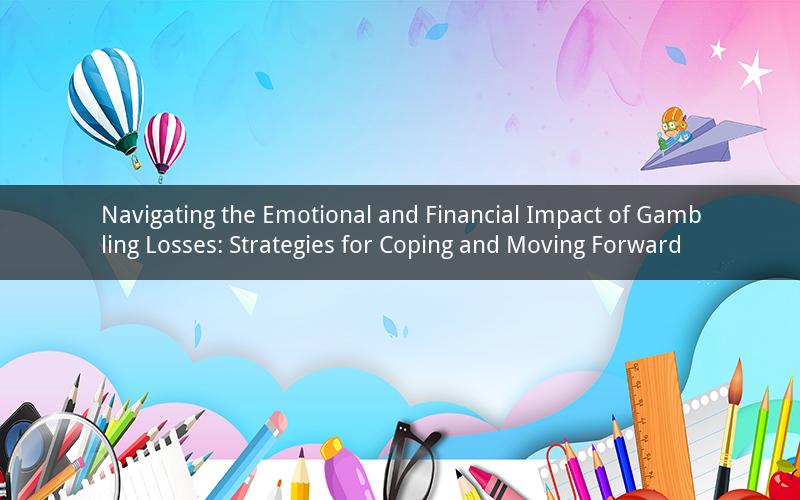
Gambling can be an exhilarating and entertaining activity, but it can also lead to significant financial and emotional losses. Understanding how to handle gambling losses is crucial for maintaining a healthy relationship with this form of entertainment. This article explores various strategies for dealing with gambling losses, including self-reflection, seeking support, and developing a plan for moving forward.
1. Reflect on the Reasons Behind Your Losses
One of the first steps in handling gambling losses is to reflect on the reasons behind them. Ask yourself questions like:
- Were you chasing losses, hoping to win back what you had already lost?
- Did you make impulsive decisions without considering the potential consequences?
- Were you under the influence of alcohol or other substances?
Understanding the underlying causes of your losses can help you identify areas for improvement and prevent future mistakes.
2. Seek Support from Friends, Family, or Professionals
Dealing with gambling losses can be challenging, and it's essential to seek support from those who care about you. Consider the following options:
- Share your experiences with friends or family members who have had similar struggles.
- Join a support group for problem gamblers, such as Gamblers Anonymous.
- Seek guidance from a mental health professional who specializes in gambling addiction.
3. Develop a Budget and Stick to It
Creating a budget is a crucial step in managing gambling losses. Determine how much money you can afford to lose without causing financial strain. Once you have a budget, stick to it and avoid the temptation to borrow money or exceed your limits.
4. Set Personal Limits and Stick to Them
Setting personal limits can help you stay in control while gambling. Consider the following limits:
- Time limit: Decide how long you will spend gambling each day or week.
- Loss limit: Determine how much money you are willing to lose before stopping.
- Win limit: Decide how much money you are willing to win before stopping.
Remember, it's essential to honor these limits, even if you feel like you're on a winning streak.
5. Practice Self-Care
Dealing with gambling losses can be emotionally taxing. It's crucial to practice self-care to maintain your mental and physical health. Consider the following self-care strategies:
- Get enough sleep: Lack of sleep can affect your judgment and decision-making abilities.
- Exercise regularly: Physical activity can help reduce stress and improve your mood.
- Eat a balanced diet: A healthy diet can provide the energy and nutrients you need to cope with stress.
- Engage in hobbies: Hobbies can provide a sense of accomplishment and distract you from negative thoughts.
6. Develop a Plan for Moving Forward
Once you've dealt with your gambling losses, it's essential to develop a plan for moving forward. Consider the following steps:
- Set goals: Determine what you want to achieve in the future, whether it's financial stability or personal growth.
- Create a roadmap: Break down your goals into smaller, manageable steps.
- Stay committed: Stick to your plan and be patient with yourself as you progress.
By following these strategies, you can effectively handle gambling losses and maintain a healthy relationship with this form of entertainment.
Frequently Asked Questions:
1. How can I prevent gambling losses?
To prevent gambling losses, it's essential to set a budget, stick to it, and avoid chasing losses. Additionally, consider setting personal limits for time, money, and wins to maintain control while gambling.
2. What should I do if I feel overwhelmed by my gambling losses?
If you feel overwhelmed by your gambling losses, it's important to seek support from friends, family, or professionals. Joining a support group, such as Gamblers Anonymous, or speaking with a mental health professional can provide you with the guidance and resources you need to cope with your situation.
3. Can gambling losses affect my relationships?
Yes, gambling losses can affect your relationships, especially if they lead to financial strain or emotional turmoil. Open communication with your loved ones and seeking support can help you navigate these challenges and maintain healthy relationships.
4. How can I overcome the guilt associated with gambling losses?
Overcoming the guilt associated with gambling losses may require time and patience. Reflecting on the reasons behind your losses, seeking support, and practicing self-care can help you process your emotions and move forward.
5. Is it possible to recover from gambling losses?
Yes, it is possible to recover from gambling losses. By developing a plan for moving forward, seeking support, and maintaining a healthy lifestyle, you can overcome the challenges associated with gambling and move towards a more positive future.